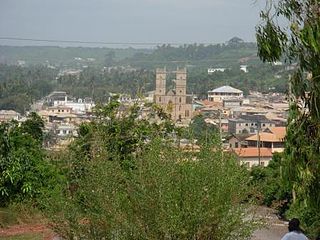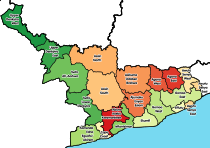The diverse culture of Ivory Coast, a coastal West African country bordered by Ghana, Liberia, Mali, Burkina Faso, and Guinea, is exemplified by a multitude of ethnic groups, events, festivals, music, and art.

Tema is a city on the Bight of Benin and Atlantic coast of Ghana. It is located 25 kilometres (16 mi) east of the capital city; Accra, in the region of Greater Accra, and is the capital of the Tema Metropolitan District. As of 2013, Tema is the eleventh most populous settlement in Ghana, with a population of approximately 161,612 people – a marked decrease from its 2005 figure of 209,000. The Greenwich Meridian passes directly through the city. Tema is locally nicknamed the "Harbour City" because of its status as Ghana's largest seaport. It consists of 25 different communities which are numbered accordingly with each of them having easy access to the basic amenities.

Kebbi state is a state in the northwestern Nigeria, Kebbi state is bordered east and north of Sokoto and Zamfara states, and to the south by Niger state while its western border forms part of the national borders with Benin Republic and Niger. Named for the city of Birnin Kebbi—the state's capital and largest city, Kebbi state was formed from Sokoto state on 27 August 1991. Of the 36 states of Nigeria, Kebbi is the tenth largest in area and 22nd most populous, with an estimated population of about 4.4 million as of 2016. The state is known as land of equity.
The Frafra are a subset of the Gurunsi peoples living in Northern Ghana. The preferred name for the group is Fare-Fare. The adopted name Frafra is a corruption from colonial times of the greeting "Ya fara-fara?" which means "How is your suffering [work]?" It may carry pejorative overtones in local usage. Frafra-language speakers number approximately 300,000. The larger group of Gurunsi people inhabit southern Burkina Faso and Northern Ghana.
The Efutu are an Akanized Guang people that are the original inhabitants of present-day Ghana. They founded the coastal area about 1390 C.E. The Efutu are found in Awutu, Adina, Senya-Beraku and Winneba and their main occupation is fishing. Like most Guans, they were somewhat absorbed into the greater Akan culture and adopted Akan names via annexing and military campaigns as the Akan were natural warriors. Similar to the Akuapem people of the Eastern Region of Ghana who are ruled by an Akan Abusua but was originally ruled by their own Guan kings. They also have adopted the Fante version of some Akan institutions and the use of some Fante words in their rituals. Before Akanization, the Simpa Kingdom was formed about 1400 AD.
Dambai is a city in Ghana and the administrative capital of the newly created Oti Region.
African-American folktales are the storytelling and oral history of enslaved African Americans during the 1700-1900s. These stories reveal life lessons, spiritual teachings, and cultural knowledge and wisdom for the African-American community African-American cultural heritage. During slavery, African-Americans created folk stories that spoke about the hardships of slavery and created folk spirits and heroes that were able to out wit and out smart their slaveholders and defeat their enemies. These folk stories gave hope to enslaved people that folk spirits will free them from slavery. Many folktales are unique to African-American culture, while others are influenced by African, European, and Native American tales.

Anomabu, also spelled Anomabo and formerly as Annamaboe, is a town on the coast of the Mfantsiman Municipal District of the Central Region of South Ghana. Anomabu has a settlement population of 14,389 people.

The Hausa are a native ethnic group in West and Central Africa. They speak the Hausa language, which is the second most spoken language after Arabic in the Afro-Asiatic language family. The Hausa are a diverse but culturally homogeneous people based primarily in the Sahelian and the sparse savanna areas of southern Niger and northern Nigeria respectively, numbering around 53 million people with significant indigenized populations in Benin, Cameroon, Ivory Coast, Chad, Sudan, Central African Republic, Republic of the Congo, Togo, Ghana, Eritrea, Equatorial Guinea, Gabon, Senegal and the Gambia.

Fishing in Ghana is made up of both ocean caught fish, as well as freshwater fishing in lakes and rivers.

The Obolo people are an ethnic group in the Niger Delta region of Nigeria. Obolo people are found in Rivers State and Akwa Ibom State. They have historical relations with the Oron people, Ohafia, Igbo Ogoloma, Ido, and Ibeno people, who are also from the Niger Delta.
Filipinos in South Africa are either migrants or descendants of the Philippines living in South Africa. Roughly half of them live in Gauteng and another 40% in Kalk Bay.
Nana Amuah-Afenyi VI, known informally as King Peggy, is the reigning chief of the town of Tantum, in the Mfantsiman Municipal District, Ghana. Born in the Gold Coast and a naturalized citizen of the United States since 1997, she moved to the United States in the 1970s when she was in her early twenties to work as a secretary at the Embassy of Ghana in Washington, D.C., where she still works. Following the death of her uncle in 2008, she was selected as his successor through a series of traditional rituals. She is a devout Christian, and she lives in Silver Spring, Maryland.

Saltpond is a town and the capital of the Mfantsiman Municipal District in the Central Region of South Ghana. Saltpond has a population of 24,689 people.

Keta Lagoon, also called Anlo-Keta lagoon, is the largest of the over 90 lagoons that cover the 550 km stretch of the coastline of Ghana. This lagoon is 126.13 km in length. It is located in the eastern coast of Ghana and separated from the Gulf of Guinea by a narrow strip of sandbar. This open salty water is surrounded by flood plains and mangrove swamps. Together they form the Keta Lagoon Ramsar site which covers 1200 km2

The Fancy Dress Festival is a masquerade festival held on Christmas to the first day of January every year by the people of Winneba in the Central region of Ghana. It is a colourful festival that features brass band music.

The Bakatue Festival is celebrated by the chiefs and peoples of Elmina in the Central Region of Ghana. The festival, established at least as far back as 1847, is celebrated on the first Tuesday in the month of July every year.
Ugbo Kingdom is a town in Ilaje local government area of Ondo State, South West Nigeria. The people of Ugbo Kingdom are predominantly fishermen.
Fort Tantumquery is a military structure designed to facilitate the slave trade. The Royal African Company built it in the 1720s, at Otuam in the Mfantsiman Municipal District, Central Region, Ghana, in what was known at the time as the Gold Coast.
Sabon Zango or Sabon Zongo is a Zongo residential town in the Greater Accra Region of Ghana. The name " Sabon Zango" has its etymology from the Hausa Language which literally means the "new settlement". The town was founded by some of the earliest Hausa settlers in Southern Ghana. It remains one of the oldest Zongo settlements in the country due to the events that led to the town's resettlement. It is also the birthplace of Ghana's current Second lady Samira Bawumia. Sabon Zango shares boundary with the Korle-Bu Teaching Hospital.











